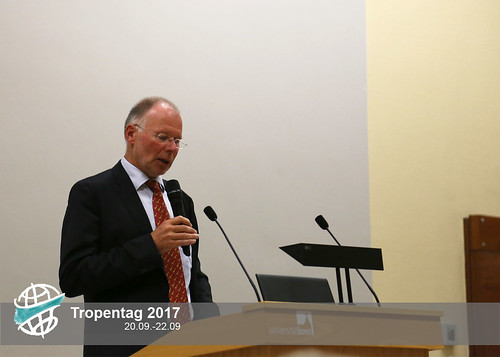“Smallscale Organic Agriculture is a Niche”

“Small-scale organic agriculture is a niche” said Hans-Joachim Preuß, the managing director of GIZ, the largest development aid agency in Germany. Apparently, the future of development is large-scale industrial agriculture and big investment, according to the agenda of GIZ. “Smallscale organic agriculture won’t save the world”, said Hans Braun, director of the CGIAR Research Program on Wheat at CIMMYT, a research and training institution focused on wheat and maize. I wondered, what happened to sustainable agriculture?

The excitement and expectations of the participants of Tropentag about this year’s theme “Future Agriculture: Social-ecological transitions and bio-cultural shifts” didn't flag and were mostly met throughout the week, at least until the last two keynote speakers. Braun suggested further intensification of grain cultivation, as well as greater collaboration with the GIZ. Braun’s statements were reinforced by Preuß, who said organic products were to “only" address a “niche market”.
In a sense, Preuß’ message should not be that astonishing, as he is, an agrarian economist by training and aims for large investments that offer the highest return rate. He advocates agricultural intensification, with increased use of synthetic pesticides and fertilizers as well as the expansion of controversial public–private partnerships (PPPs). It seems surprising that Germany (or more precisely the Federal Ministry of Economic Cooperation and Development) is still supporting these kinds of policies. Wouldn’t it make a lot more sense to fund research in agroecology, and support food sovereignty and resource efficiency?
Preuß, moreover, highlighted Brazil’s agricultural production system as a positive example. However Brazil’s economic success has showed that big investments in highly-mechanized commercial monocultures like unshaded coffee and cocoa, oil palms, soybeans, cotton or even biofuel crops may increase the GDP and employment in a short term, but ultimately results in deforestation, soil degradation and in the long run social injustice and unrest. Indigenous peoples, living peacefully in symbiosis with nature, are often displaced by corrupt enterprises on behalf of “sustainable development projects”.
These major concerns were also mirrored by many people from the audience: “I am surprised that the director of one of the biggest development assistance organizations opts for largescale agriculture”, someone remarked.
Civil society needs to stand up for the importance of smallscale agriculture, which could be the answer for a true social-ecological transition towards a sustainable global agriculture.
The time is now.





Comments
Post new comment